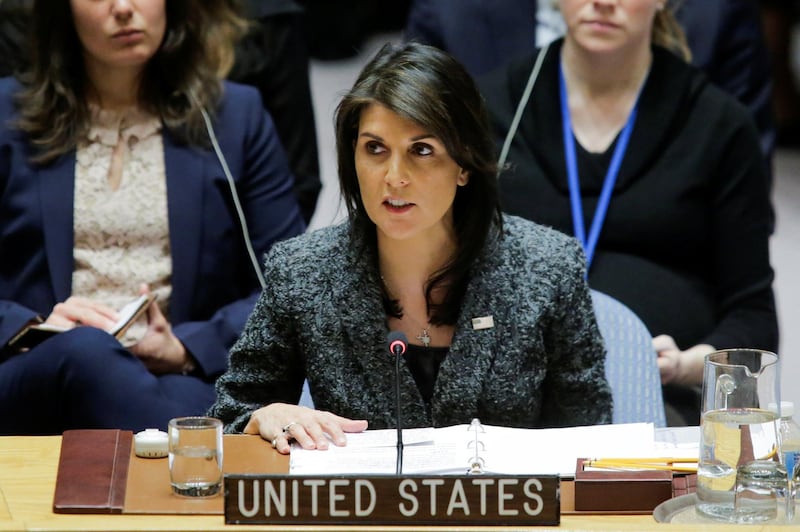The US threatened unilateral action against Iran after Russia vetoed a UN Security Council resolution on Tehran’s failure to stop its weapons from reaching Houthi rebels in Yemen.
"If Russia is going to continue to cover for Iran then the US and our partners need to take action on our own,” said US ambassador to the United Nations Nikki Haley on Monday.
“If we’re not going to get action on the council then we have to take our actions.”
Ms Haley did not specify what kind of action could be taken.
Russia on Monday vetoed the resolution that would have expressed concern over Iran’s failure to block supplies of missile to the Houthis and called for “additional measures”.
It marks the second time in recent days that the Russian ambassador has used his position to shield a regional ally in the Middle East.
Iran said on Tuesday that Russia’s veto of the resolution — which was drafted by Britain and strongly supported by the US — represented another setback for America.
"Based on a one-sided report, they intended to pass a resolution that referred to Iran, but they failed," said Iran's deputy foreign minister Abbas Araghchi, according to the official IRNA news agency.
"This is yet another failure by the US government to drag Iran to the Security Council.
"Over the past year the US government has tried many times to drag Iran to the Security Council and it has failed every single time.”
__________
Read more: Russia vetoes UN action against Iran over arming of Houthis
__________
Washington last month called for a Security Council emergency session to address street protests in Iran. Later in the month, a Security Council panel of experts released a report stating that missiles fired into Saudi Arabia from Yemen were made in Iran.
The report did not say Iran had supplied the missiles, but said the country was still in breach of an arms embargo on Yemen by failing to stop them reaching the rebel group.
"The biased allegation was absolutely clear in the way the report was formulated," said Mr Aragchi.
The investigating team had "made its own judgement even before travelling to Iran and hearing what we had to say. It was clear how others had influenced the report," he said, without specifying who was to blame.
After Russia vetoed the resolution on Monday, the 15-member Security Council unanimously adopted a Russian-drafted measure that extended the sanctions regime against Yemen for one year, but made no mention of Iran's involvement in the war there.
"We will definitely continue our policies in the region in the way that serves our national interests," Mr Aragchi said.
A Saudi-led Arab coalition — which includes the UAE — intervened in the Yemeni war in 2015 on behalf of the internationally recognised government of President Abdrabu Mansur Hadi against the Iran-backed Houthi rebels.
More than 10,000 people have died in fighting in Yemen that began as a domestic conflict after the Houthis took control of the capital, Sanaa. Millions of people are on the brink of famine and more than 22 million — almost the entire population — are in need, according to humanitarian agencies.
Iran has always denied arming the Houthis and has instead accused the US of faking evidence or has pointed the finger at other nations.
On Monday, it once again denied the allegations and said western powers were simply trying to shift the blame.





